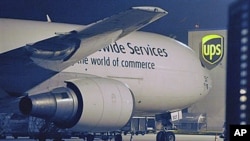U.S. intelligence officials say the shipment of three suspicious packages from Yemen to the U.S. in September was probably a test run for last week's terrorist plot of parcel bombs.
Officials disclosed that the packages sent in September were intercepted by intelligence agents before they reached their final destination of Chicago. They contained books, papers, compact discs and other materials.
Authorities said the Yemeni-based al-Qaida in the Arabian Peninsula used the shipments to plan the route and timing for two cartridges (or containers) of computer printer ink that were filled with explosives. The containers were intercepted last week in Britain and Dubai after being shipped from Yemen.
Intelligence officials said they already were aware of the terrorists' interest in attacking the aviation industry, and considered the possibility they would target cargo planes. Officials said the September incident prompted their quick response to last week's plot.
Germany has banned all passenger flights from Yemen.
Britain, Canada and Germany have tightened rules on air cargo shipments from Yemen. Britain also has banned passengers from carrying large printer cartridges on flights, and suspended unaccompanied air cargo from Somalia.
Yemen called the new restrictions "collective punishment." A statement in Yemen's state-run media on Tuesday said Germany's decision and other "hasty reactions" harm Yemeni efforts to fight terrorism and help al-Qaida with its goal of straining the country's relations with allies.
Separately, the head of an international aviation group, with members representing 93 percent of all scheduled international flights, said the events in Yemen have made cargo security the top priority. International Air Transport Association chief Giovanni Bisignani made the announcement Tuesday as the group unveiled plans for a global airport security effort.
The plans include better airport screening technology and standardizing data collection methods.
Some information for this report was provided by AP and AFP.




